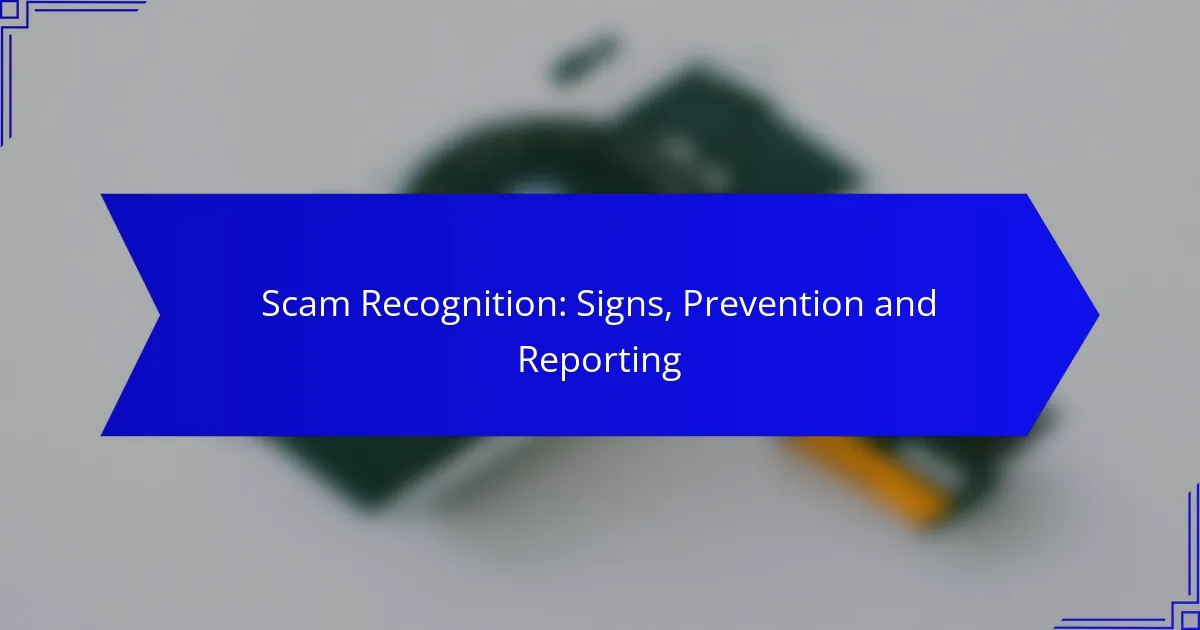Scam recognition is essential for safeguarding yourself against fraud, as identifying common signs can help you avoid falling victim. Key indicators include unrealistic promises, pressure tactics, and requests for personal information. By staying informed and verifying information, you can take proactive measures to prevent scams and protect your finances.
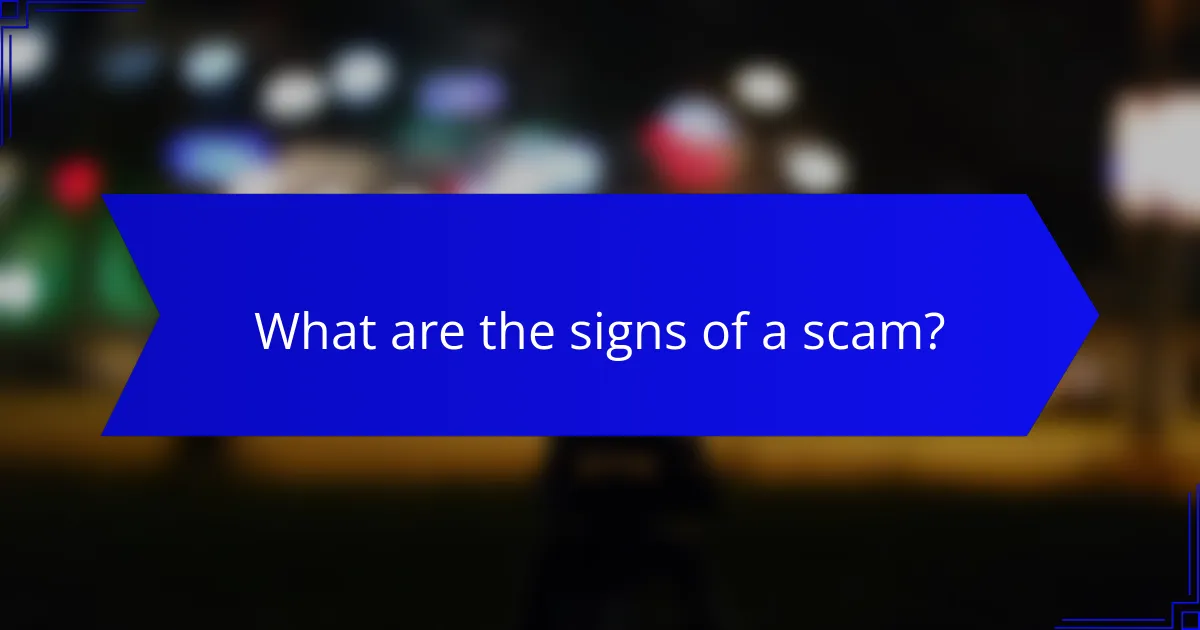
What are the signs of a scam?
Recognizing the signs of a scam is crucial for protecting yourself from fraud. Common indicators include unrealistic promises, pressure tactics, unverified sources, requests for personal information, and poor grammar or spelling.
Unrealistic promises
Scammers often lure victims with offers that seem too good to be true, such as guaranteed returns on investments or prizes that require no effort to claim. If an opportunity promises significant rewards with little risk, it is likely a scam.
Be cautious of claims that sound overly optimistic or miraculous. Legitimate businesses typically provide clear, realistic expectations rather than extraordinary guarantees.
Pressure tactics
Scammers frequently use high-pressure tactics to rush individuals into making quick decisions. This may include limited-time offers or threats of negative consequences if immediate action is not taken.
Take your time to evaluate any offer that feels rushed. A legitimate opportunity will allow you the necessary time to consider your options without undue pressure.
Unverified sources
Always verify the source of any communication before engaging further. Scammers often impersonate reputable organizations or use fake websites to gain trust.
Check for official contact information and look for reviews or reports about the organization online. If you cannot verify the source, it’s best to avoid any interaction.
Requests for personal information
Be wary of any unsolicited requests for personal information, such as Social Security numbers, bank details, or passwords. Scammers often claim they need this information for verification or to process a reward.
Legitimate companies will rarely ask for sensitive information through unsecured channels. Always verify the request through official channels before providing any details.
Poor grammar and spelling
Many scams are poorly written, containing grammatical errors and misspellings. These mistakes can be a red flag indicating a lack of professionalism and authenticity.
If you receive a message that is riddled with errors, it’s wise to approach it with skepticism. Legitimate organizations typically maintain high standards in their communications.
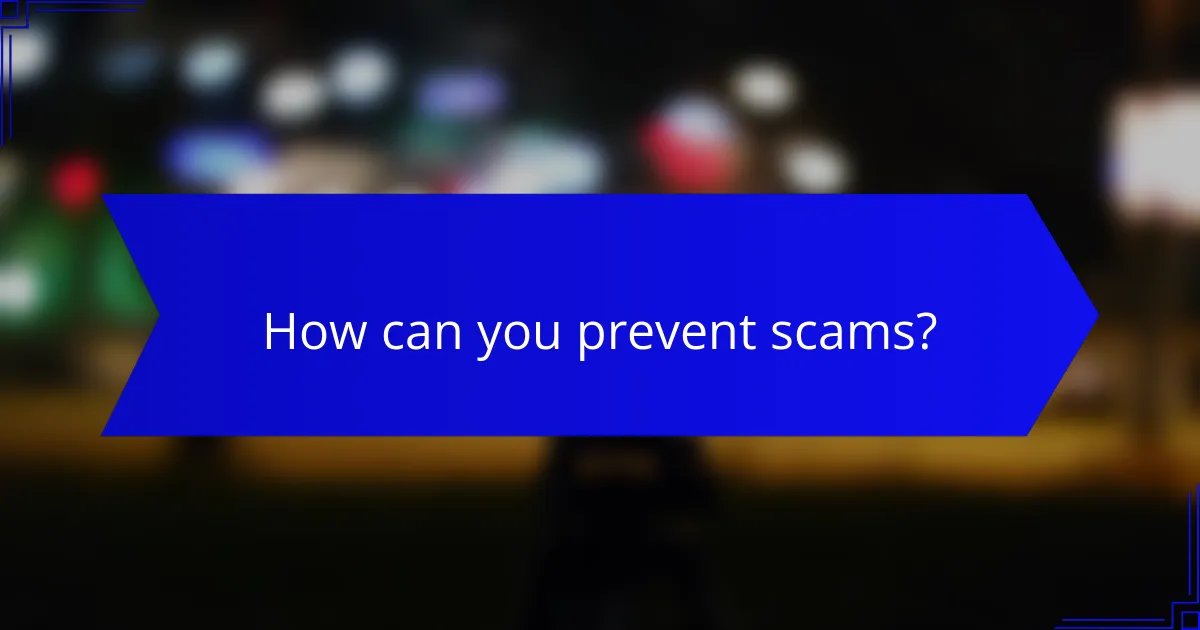
How can you prevent scams?
Preventing scams involves staying informed, using secure methods for transactions, and verifying information before acting. By taking proactive steps, you can significantly reduce your risk of falling victim to fraudulent schemes.
Educate yourself about common scams
Understanding the types of scams that exist is crucial for prevention. Common scams include phishing emails, fake lottery winnings, and investment fraud. Familiarize yourself with these tactics to recognize red flags quickly.
Stay updated on emerging scams by following consumer protection websites or local news outlets. Many organizations provide resources and alerts about new scams targeting specific demographics or regions.
Use secure payment methods
Choosing secure payment methods can protect your financial information. Use credit cards instead of debit cards for online purchases, as they often offer better fraud protection. Services like PayPal or other reputable payment platforms can add an extra layer of security.
Avoid wire transfers or sending money via apps to unknown individuals, as these transactions are harder to reverse if a scam occurs. Always opt for payment methods that provide buyer protection or dispute resolution options.
Verify sources before engaging
Before responding to any unsolicited communication or offers, verify the source. Check official websites or contact organizations directly using known contact information. Scammers often impersonate legitimate entities to gain your trust.
Look for reviews or reports about the individual or company online. A quick search can reveal whether others have had negative experiences, helping you make informed decisions.
Enable two-factor authentication
Two-factor authentication (2FA) adds an extra layer of security to your online accounts. By requiring a second form of verification, such as a text message code or authentication app, it makes unauthorized access more difficult.
Enable 2FA on all accounts that offer it, especially for banking and email services. This simple step can significantly reduce the risk of account compromise, even if your password is stolen.

How to report a scam in the United States?
To report a scam in the United States, you can contact various agencies that handle consumer complaints. These include the Federal Trade Commission, the Better Business Bureau, and the Internet Crime Complaint Center. Each organization has specific procedures for reporting scams, which can help protect others from falling victim.
Contact the Federal Trade Commission
The Federal Trade Commission (FTC) is the primary agency for consumer protection in the U.S. To report a scam, visit the FTC’s website and use their online complaint assistant. This tool guides you through the process of submitting your report, which can help the FTC investigate and take action against fraudulent practices.
When filing a complaint, provide as much detail as possible, including the name of the scammer, the nature of the scam, and any financial losses incurred. This information can assist the FTC in identifying patterns and targeting enforcement efforts.
Report to the Better Business Bureau
The Better Business Bureau (BBB) allows consumers to file complaints about businesses and scams. You can report a scam by visiting the BBB’s website and navigating to their complaint section. This helps inform other consumers and can prompt the BBB to take action against the business involved.
When reporting, include specific details such as the business name, the type of scam, and your experience. The BBB will then investigate the complaint and may publish the information to warn others.
File a complaint with the Internet Crime Complaint Center
The Internet Crime Complaint Center (IC3) is a partnership between the FBI and the National White Collar Crime Center. You can file a complaint about online scams by visiting the IC3 website. This is particularly useful for reporting internet-related fraud, such as phishing or online auction scams.
When submitting your complaint, provide detailed information about the incident, including any emails, website links, or other evidence. The IC3 reviews complaints and may refer them to law enforcement agencies for further investigation.
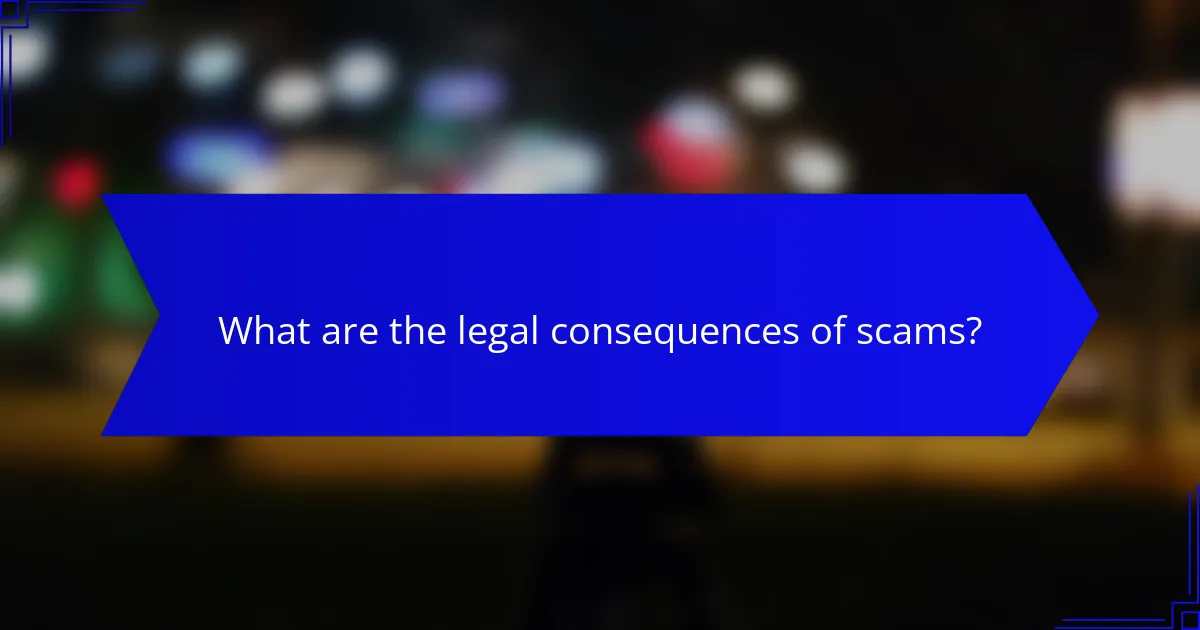
What are the legal consequences of scams?
The legal consequences of scams can be severe, often resulting in both criminal charges and civil lawsuits against the perpetrators. These consequences vary based on the nature of the scam, the amount of money involved, and local laws.
Criminal charges
Individuals found guilty of committing scams may face criminal charges, which can include fraud, embezzlement, or identity theft. Depending on the jurisdiction, these charges can lead to significant penalties, including imprisonment and hefty fines.
For example, in the United States, fraud-related offenses can result in sentences ranging from a few years to several decades, depending on the severity of the crime and any prior convictions. Repeat offenders often face harsher penalties.
Civil lawsuits
In addition to criminal charges, scammers can be subject to civil lawsuits from victims seeking restitution for their losses. Victims may sue for damages, which can include the amount lost plus additional compensation for emotional distress or punitive damages.
In many cases, victims can file these lawsuits in small claims court if the amount is within a certain limit, often ranging from a few thousand to tens of thousands of dollars, depending on local regulations. It’s crucial for victims to gather evidence and document their losses to strengthen their case.
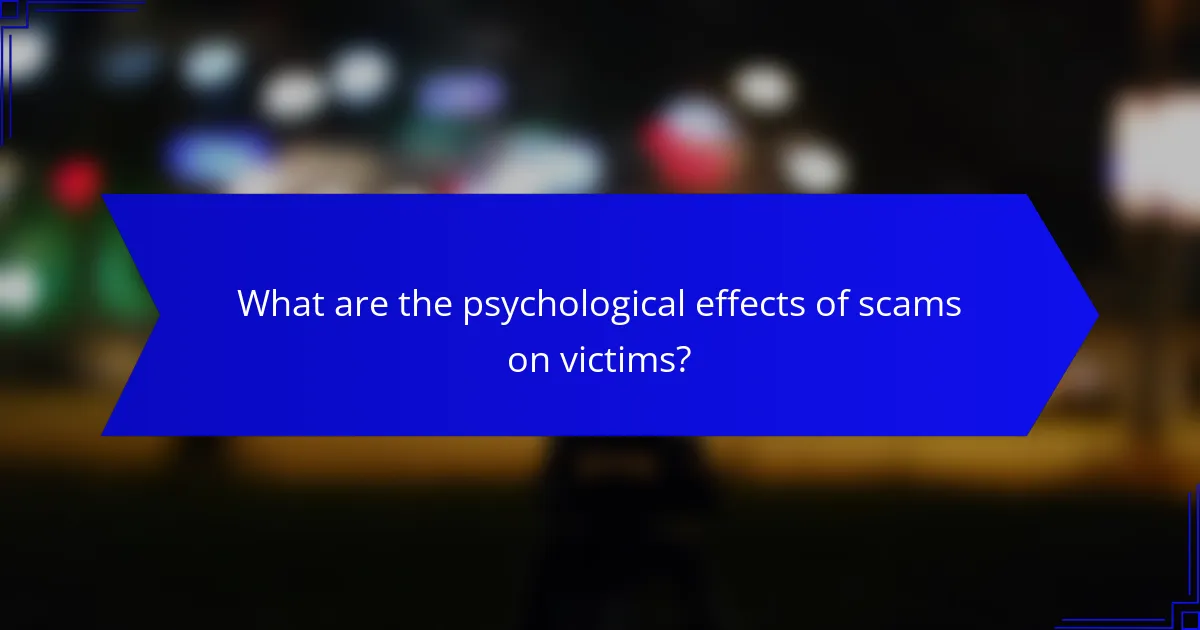
What are the psychological effects of scams on victims?
The psychological effects of scams on victims can be profound and long-lasting, often leading to emotional distress and changes in behavior. Victims may experience a range of negative feelings that can impact their daily lives and relationships.
Feelings of shame and embarrassment
Victims of scams frequently feel a deep sense of shame and embarrassment, as they may believe they should have recognized the signs of deceit. This can lead to isolation, as they may avoid discussing their experiences with friends or family out of fear of judgment.
These feelings can be exacerbated by societal stigma surrounding financial loss, making it difficult for victims to seek help or support. Acknowledging these emotions is a crucial step towards recovery and regaining confidence.
Loss of trust in others
Scams can significantly erode a victim’s trust in others, leading to a general suspicion of people and institutions. This loss of trust can extend beyond the immediate situation, affecting relationships with family, friends, and even professional contacts.
Victims may become overly cautious, avoiding situations where they might be vulnerable to further exploitation. Rebuilding trust takes time and often requires support from mental health professionals or support groups that understand the unique challenges faced by scam victims.

How do scams evolve over time?
Scams continuously adapt to changes in technology, societal behavior, and economic conditions. As new communication methods emerge, scammers refine their tactics to exploit vulnerabilities, making it crucial for individuals to stay informed about these evolving threats.
Technological advancements
Scammers leverage technological advancements to create more sophisticated schemes. For instance, the rise of social media has led to an increase in phishing attacks, where fraudsters impersonate trusted sources to steal personal information. Staying updated on the latest tech trends can help individuals recognize these tactics.
Changing consumer behavior
As consumer behavior shifts, so do the methods used by scammers. The growing reliance on online shopping has led to a surge in fake e-commerce sites, often designed to mimic legitimate retailers. Consumers should verify website authenticity before making purchases, especially if prices seem unusually low.
Regulatory responses
Governments and regulatory bodies respond to scams by implementing new laws and regulations aimed at protecting consumers. For example, stricter data protection laws can limit the information available to scammers. Staying informed about local regulations can empower individuals to recognize and report suspicious activities effectively.
